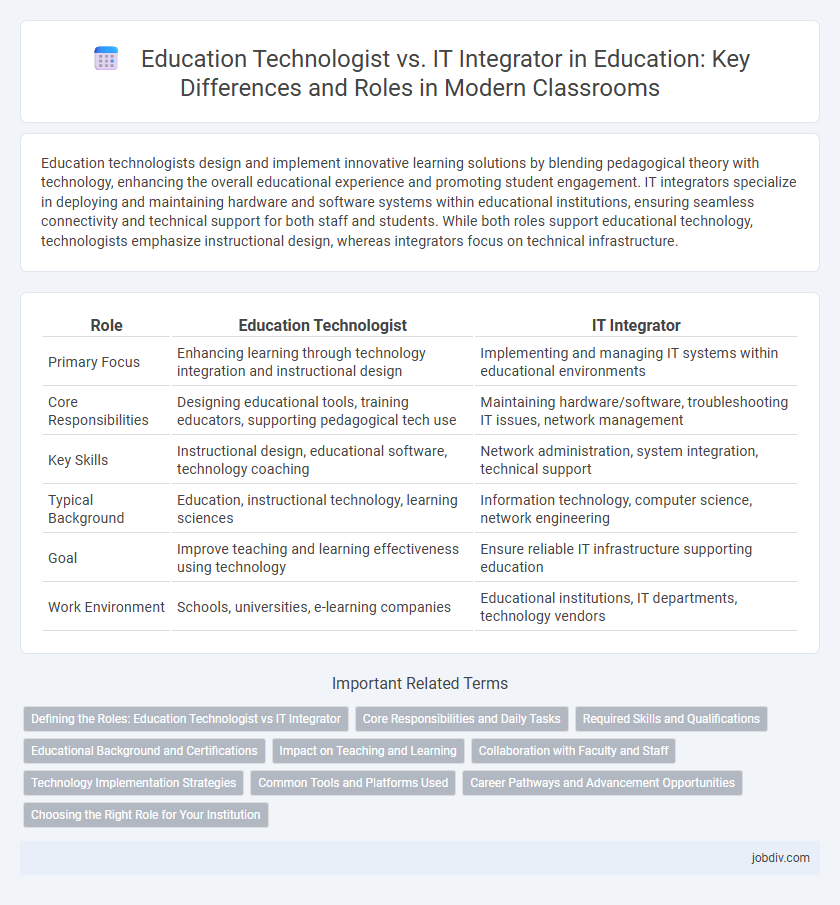Education technologists design and implement innovative learning solutions by blending pedagogical theory with technology, enhancing the overall educational experience and promoting student engagement. IT integrators specialize in deploying and maintaining hardware and software systems within educational institutions, ensuring seamless connectivity and technical support for both staff and students. While both roles support educational technology, technologists emphasize instructional design, whereas integrators focus on technical infrastructure.
Table of Comparison
| Role | Education Technologist | IT Integrator |
|---|---|---|
| Primary Focus | Enhancing learning through technology integration and instructional design | Implementing and managing IT systems within educational environments |
| Core Responsibilities | Designing educational tools, training educators, supporting pedagogical tech use | Maintaining hardware/software, troubleshooting IT issues, network management |
| Key Skills | Instructional design, educational software, technology coaching | Network administration, system integration, technical support |
| Typical Background | Education, instructional technology, learning sciences | Information technology, computer science, network engineering |
| Goal | Improve teaching and learning effectiveness using technology | Ensure reliable IT infrastructure supporting education |
| Work Environment | Schools, universities, e-learning companies | Educational institutions, IT departments, technology vendors |
Defining the Roles: Education Technologist vs IT Integrator
Education Technologists specialize in developing and implementing digital learning tools and methodologies to enhance educational outcomes, focusing on pedagogical innovation and curriculum integration. IT Integrators concentrate on the technical deployment, maintenance, and support of hardware and software systems within educational institutions, ensuring seamless technology infrastructure operations. Both roles collaboratively drive digital transformation, but the Education Technologist prioritizes instructional design while the IT Integrator emphasizes system functionality and user accessibility.
Core Responsibilities and Daily Tasks
Education Technologists design and implement instructional technologies to enhance learning experiences, focusing on curriculum integration and user training. IT Integrators manage the technical setup, maintenance, and support of educational hardware and software systems, ensuring seamless operation across devices and platforms. Both roles require collaboration with educators, but Education Technologists emphasize pedagogical outcomes, while IT Integrators prioritize technical infrastructure and system reliability.
Required Skills and Qualifications
Education Technologists require expertise in instructional design, curriculum development, and educational psychology to effectively integrate technology into learning environments. IT Integrators must possess strong technical skills in network management, hardware installation, and software troubleshooting to ensure seamless technology deployment in educational settings. Both roles demand proficiency in educational technologies, but Education Technologists emphasize pedagogical knowledge, while IT Integrators prioritize technical infrastructure and system maintenance.
Educational Background and Certifications
Education technologists often hold degrees in instructional design, educational technology, or curriculum development, emphasizing pedagogical theories and learning sciences. IT integrators typically possess backgrounds in computer science, information technology, or network administration, highlighting technical proficiency and systems management. Certifications for education technologists may include Certified Educational Technology Leader (CETL) or Google Certified Educator, whereas IT integrators often pursue CompTIA Network+, Cisco Certified Network Associate (CCNA), or Microsoft Certified Solutions Expert (MCSE).
Impact on Teaching and Learning
Education Technologists design and implement innovative digital tools tailored to enhance curriculum delivery and student engagement, driving personalized learning experiences. IT Integrators focus on seamlessly incorporating existing hardware and software into educational environments, ensuring reliable access and technical support for both teachers and students. Together, their collaboration maximizes the effective use of technology to improve teaching methodologies and learning outcomes.
Collaboration with Faculty and Staff
Education Technologists specialize in designing and implementing digital tools to enhance teaching strategies, collaborating closely with faculty to tailor technology solutions that support curriculum goals. IT Integrators focus on the technical deployment and maintenance of hardware and software systems within educational institutions, working alongside staff to ensure seamless technology operation and user support. Both roles require strong communication skills and a cooperative approach to address the evolving needs of educators and students effectively.
Technology Implementation Strategies
Education technologists design and apply technology implementation strategies that enhance teaching and learning outcomes by aligning digital tools with pedagogical goals. IT integrators focus on deploying and maintaining technical infrastructure, ensuring seamless integration of hardware and software systems within educational institutions. Both roles collaborate to optimize technology adoption, balancing instructional innovation with robust technical support for sustainable educational environments.
Common Tools and Platforms Used
Education technologists and IT integrators commonly utilize platforms such as Google Workspace for Education, Microsoft Teams, and learning management systems like Canvas or Moodle to enhance digital learning environments. Both professionals leverage tools including digital assessment software, interactive whiteboards, and cloud-based collaboration apps that support classroom engagement and administration. Their expertise enables seamless integration of these technologies, optimizing instructional delivery and user experience across educational institutions.
Career Pathways and Advancement Opportunities
Education Technologists specialize in designing and implementing digital learning tools, focusing on curriculum integration and pedagogical enhancement, which often leads to roles like Instructional Designer or Learning Experience Manager. IT Integrators primarily handle the technical infrastructure and system deployment within educational settings, with career progression often leading to IT Manager or Systems Administrator positions. Both career paths offer advancement opportunities, but Education Technologists tend to move towards academic innovation roles, while IT Integrators advance through technical leadership and network management.
Choosing the Right Role for Your Institution
Education Technologists specialize in designing and implementing digital learning resources tailored to pedagogical goals, ensuring technology enhances student engagement and curriculum delivery. IT Integrators focus on the technical deployment and maintenance of hardware and software systems, guaranteeing seamless infrastructure functionality within educational settings. Selecting the right role depends on whether the institution prioritizes strategic educational innovation or robust IT system management for optimal learning environments.
Education Technologist vs IT Integrator Infographic

 jobdiv.com
jobdiv.com